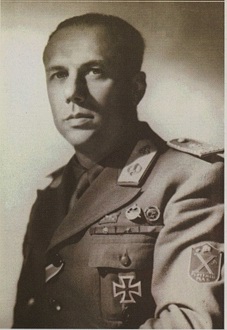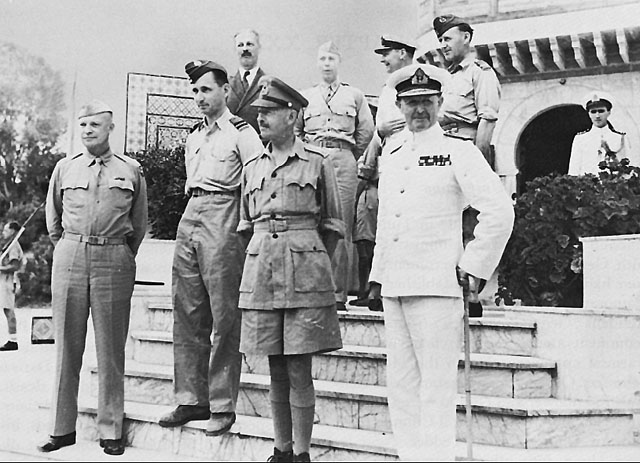|
National Republican Army
The National Republican Army (Esercito Nazionale Repubblicano, or ENR) was the army of the Italian Social Republic ( it, Repubblica Sociale Italiana, or RSI) from 1943 to 1945 that fought on the side of Nazi Germany during World War II. The ENR was officially formed 28 October 1943, by merging former Royal Army (''Regio Esercito'') units still loyal to fascist dictator Benito Mussolini and Italian pro-Nazi units raised by the Germans after the occupation of southern Italy. History As a consequence of the Allied invasion of Sicily in July 1943, political forces allied to king Victor Emmanuel III took power in Italy, imprisoned dictator Benito Mussolini and negotiated an armistice between Italy and the Allied armed forces that took effect on 8 September 1943. On 12 September 1943, the Germans launched " Operation Oak" (''Unternehmen Eiche'') and rescued Mussolini. The Fascist Italian Social Republic (''Repubblica Sociale Italiana'', or RSI) was formed as a puppet state in nor ... [...More Info...] [...Related Items...] OR: [Wikipedia] [Google] [Baidu] |
Italian Social Republic
The Italian Social Republic ( it, Repubblica Sociale Italiana, ; RSI), known as the National Republican State of Italy ( it, Stato Nazionale Repubblicano d'Italia, SNRI) prior to December 1943 but more popularly known as the Republic of Salò ( it, Repubblica di Salò ), was a German puppet state with limited diplomatic recognition which was created during the later part of World War II, that existed from the beginning of the German occupation of Italy in September 1943 until the surrender of German troops in Italy in May 1945. The German occupation regime provoked widespread national resistance, leading to the Italian Civil War. The Italian Social Republic was the second and final incarnation of the Italian Fascist state, oficially led by Benito Mussolini and his reformed anti-monarchist Republican Fascist Party. The newly-founded state declared Rome its capital but was ''de facto'' centred on Salò (hence its colloquial name), a small town on Lake Garda, near Brescia ... [...More Info...] [...Related Items...] OR: [Wikipedia] [Google] [Baidu] |
Decima Flottiglia MAS
The ''Decima Flottiglia MAS'' (''Decima Flottiglia Motoscafi Armati Siluranti'', also known as ''La Decima'' or Xª MAS) (Italian for "10th Assault Vehicle Flotilla") was an Italian flotilla, with commando frogman unit, of the ''Regia Marina'' (Italian Royal Navy) created during the Fascist regime. The acronym '' MAS'' also refers to various light torpedo boats used by the Regia Marina during World War I and World War II. Decima MAS was active during the Battle of the Mediterranean and took part in a number of daring raids on Allied shipping. These operations involved surface speedboats (such as the raid on Souda Bay), manned torpedoes (the raid on Alexandria) and ''Gamma'' frogmen (against Gibraltar). During the campaign Decima MAS took part in more than a dozen operations which sank or damaged five warships (totalling 72,000 tons) and 20 merchant ships (totalling 130,000 GRT). In 1943, after the Italian dictator Benito Mussolini was ousted, Italy left the Tripartite Pac ... [...More Info...] [...Related Items...] OR: [Wikipedia] [Google] [Baidu] |
Division (military)
A division is a large military unit or Formation (military), formation, usually consisting of between 6,000 and 25,000 soldiers. In most armies, a division is composed of several regiments or brigades; in turn, several divisions typically make up a corps. Historically, the division has been the default combined arms unit capable of independent Military tactics, operations. Smaller combined arms units, such as the American regimental combat team (RCT) during World War II, were used when conditions favored them. In recent times, modern Western militaries have begun adopting the smaller brigade combat team (similar to the RCT) as the default combined arms unit, with the division they belong to being less important. While the focus of this article is on army divisions, in naval usage "division (naval), division" has a completely different meaning, referring to either an administrative/functional sub-unit of a department (e.g., fire control division of the weapons department) aboar ... [...More Info...] [...Related Items...] OR: [Wikipedia] [Google] [Baidu] |
Defence Minister
A defence minister or minister of defence is a cabinet official position in charge of a ministry of defense, which regulates the armed forces in sovereign states. The role of a defence minister varies considerably from country to country; in some the minister is only in charge of general budget matters and procurement of equipment; while in others the minister is also an integral part of the operational military chain of command. A defence minister could be titled Minister for Defense, ''Minister of National Defense'', Secretary of Defense, ''Secretary of State for Defence'', Minister of War or some similar variation. Lists * List of current defence ministers See also * Chief of Defence * Commander-in-chief * Ministry of defence * War cabinet References {{Types of government minister Defence Defense or defence may refer to: Tactical, martial, and political acts or groups * Defense (military), forces primarily intended for warfare * Civil defense, the organizin ... [...More Info...] [...Related Items...] OR: [Wikipedia] [Google] [Baidu] |
Marshal
Marshal is a term used in several official titles in various branches of society. As marshals became trusted members of the courts of Medieval Europe, the title grew in reputation. During the last few centuries, it has been used for elevated offices, such as in military rank and civilian law enforcement. In most countries, the rank of Marshal is the highest Army rank (equivalent to a five-star General of the Army in the United States). Etymology "Marshal" is an ancient loanword from Norman French (cf. modern French ''maréchal''), which in turn is borrowed from Old Frankish *' (="stable boy, keeper, servant"), being still evident in Middle Dutch ''maerscalc'', ''marscal'', and in modern Dutch ''maarschalk'' (="military chief commander"; the meaning influenced by the French use). It is cognate with Old High German ' "id.", modern German ''(Feld-)Marschall'' (="military chief commander"; the meaning again influenced by the French use). It originally and literally meant ... [...More Info...] [...Related Items...] OR: [Wikipedia] [Google] [Baidu] |
Puppet State
A puppet state, puppet régime, puppet government or dummy government, is a State (polity), state that is ''de jure'' independent but ''de facto'' completely dependent upon an outside Power (international relations), power and subject to its orders.Compare: Puppet states have nominal Sovereign state, sovereignty, but a foreign power effectively exercises control through means such as financial interests, economic, or military support. By leaving a local government in existence the outside Powers evade all responsibility, while at the same time successfully paralyzing the Government they tolerate. Puppet states are distinguished from Alliance, allies, which choose their actions on their own or in accordance with Treaty, treaties they voluntarily entered. Puppet states are forced into Rubber stamp (politics), providing legal endorsement for actions already taken by a foreign power. Characteristics A puppet state preserves the external paraphernalia of independence (such as a ... [...More Info...] [...Related Items...] OR: [Wikipedia] [Google] [Baidu] |
Gran Sasso Raid
During World War II, the Gran Sasso raid (codenamed ''Unternehmen Eiche'', , literally "Operation Oak", by the German military) on 12 September 1943 was a successful operation by German paratroopers and ''Waffen-SS'' commandos to rescue the deposed Fascist dictator Benito Mussolini from custody in the Gran Sasso d'Italia massif. The airborne operation was personally ordered by Adolf Hitler, approved by General Kurt Student and planned and executed by Major Harald Mors. Background On the night between 24 and 25 July 1943, a few weeks after the Allied invasion of Sicily and bombing of Rome, the Grand Council of Fascism voted a motion of no confidence against prime minister Benito Mussolini. On the same day, King Victor Emmanuel III replaced him with Marshal Pietro Badoglio and had Mussolini arrested. This is commonly known as the Fall of the Fascist regime in Italy (or ''25 Luglio'' in Italian); Badoglio's government at first continued the war on the Axis powers' side, bu ... [...More Info...] [...Related Items...] OR: [Wikipedia] [Google] [Baidu] |
Armistice Between Italy And Allied Armed Forces
The Armistice of Cassibile was an armistice signed on 3 September 1943 and made public on 8 September between the Kingdom of Italy and the Allies during World War II. It was signed by Major General Walter Bedell Smith for the Allies and Brigade General Giuseppe Castellano for Italy at a conference of generals from both sides in an Allied military camp at Cassibile, in Sicily, which had recently been occupied by the Allies. The armistice was approved by both the Italian King Victor Emmanuel III and Marshal Badoglio, the Prime Minister of Italy at the time. Germany moved rapidly by freeing Benito Mussolini (12 September) and attacking Italian forces in Italy (8–19 September), southern France and the Balkans. The Italian forces were quickly defeated, and most of Italy was occupied by German troops, who established a puppet state, the Italian Social Republic. The king, the Italian government, and most of the navy escaped to territories occupied by the Allies. Background Fo ... [...More Info...] [...Related Items...] OR: [Wikipedia] [Google] [Baidu] |
Victor Emmanuel III Of Italy
Victor Emmanuel III (Vittorio Emanuele Ferdinando Maria Gennaro di Savoia; 11 November 1869 – 28 December 1947) was King of Italy from 29 July 1900 until his abdication on 9 May 1946. He also reigned as Emperor of Ethiopia (1936–1941) and King of the Albanians (1939–1943). During his reign of nearly 46 years, which began after the assassination of his father Umberto I, the Kingdom of Italy became involved in two world wars. His reign also encompassed the birth, rise, and fall of Italian Fascism and its regime. During the First World War, Victor Emmanuel III accepted the resignation of Prime Minister Paolo Boselli and named Vittorio Emanuele Orlando (the ''premier of victory'') in his place. Despite being on the winning side of the First World War, Italy did not get all the territories which had been promised to it in the 1915 Treaty of London; the Treaty of Versailles, ending the war, failed to give Italy its demands for Fiume and Dalmatia. This mutilated victory led ... [...More Info...] [...Related Items...] OR: [Wikipedia] [Google] [Baidu] |
Allied Invasion Of Sicily
The Allied invasion of Sicily, also known as Operation Husky, was a major campaign of World War II in which the Allied forces invaded the island of Sicily in July 1943 and took it from the Axis powers ( Fascist Italy and Nazi Germany). It began with a large amphibious and airborne operation, followed by a six-week land campaign, and initiated the Italian campaign. To divert some of the Axis forces to other areas, the Allies engaged in several deception operations, the most famous and successful of which was Operation Mincemeat. Husky began on the night of 9–10 July 1943 and ended on 17 August. Strategically, Husky achieved the goals set out for it by Allied planners; the Allies drove Axis air, land and naval forces from the island and the Mediterranean sea lanes were opened for Allied merchant ships for the first time since 1941. These events led to the Italian leader, Benito Mussolini, being toppled from power in Italy on 25 July, and to the Allied invasion of Italy on 3 ... [...More Info...] [...Related Items...] OR: [Wikipedia] [Google] [Baidu] |








